一般过去时
一般过去时的概念及用法

一般过去时的概念及用法一、基本概念一般过去时(simple past tense)表示过去某个时间里发生的非持续性动作或存在的状态,也表示经常或反复发生的动作。
用动词的过去式表示,常和表示过去的时间状语连用,如:yesterday,last night,in 1990,two days ago,before,the age of等。
一般过去时也表示过去经常或反复发生的动作,常和often,always等表示频率的时间状语连用。
表示过去习惯性、经常性的动作、行为;过去所具备的能力和性格。
二、动词变化1.直接加ed: work—— worked look——looked2.以不发音e结尾的单词,直接加d: live ——lived hope——hoped use——used 3.以+y结尾的,变y为i加ed: study—— studied carry——carried worry——worried 4.以一个辅音字母结尾的,双写最后的+ed: stop—— stopped plan——planned重读闭音节体现形式为辅-元-辅结构,例如nod, n为辅音,o为元音,d为辅音。
5. 以ic结尾的动词,要把ic变成ick再加ed,如picnic→picnicked,traffic→trafficked 6.不规则变化的动词:have---had are---were get---got say---said feel---felt do/does---did is---was go---went drink--drank eat--ate bring----brought think----thought buy----bought catch---- caught teach ---- taught sit----sat wear----wore cut----cut sweep----swept sleep——slept see----saw bee----became read——read7.以辅元辅结尾的加d三、用法(1)一般过去时表示在某个特定时间发生,也可以表示过去习惯性、经常性的动作。
一般过去时

谓语动词的构成形式
一般过去时的谓语动词有be动词和行为动词两种 be动词的过去式为was和were两种。 行为动词的过去式,其变化分为规则和不规则的 变化。
规则动词过去式的构成:
1.一般动词原形末尾加-ed. 如look—>looked , stay—>stayed; 2.以不发音e结尾的动词只加-d。 如hope—>hoped , live—>lived; 3.末尾只有一个辅音字母结尾的重读闲音节的动词,应 先双写这音字母,在家-ed。 如:stop—>stopped , plan(计划)—>planned; 4.结尾是“辅音字母+y”的动词,现将y改为i,再加-ed 如:study—>studied , carry—>carried。
一般过去时态常见的基本用法
1.表示在过去时间里发生的动作或存在的状态。 Liu Jie got up at 7:10 this morning. He was a student three year ago.
2.表示过去经常或反复发生的动作。 Zhang Yaru always went to school by bike last term.
一般过去时
The simple past
一般过去时:
定义:动词的一般过去时态表示过去发生 的动作、情况或存在的状态。行为动词 (即定义动词)的过去式一般没有人称和 数的变化。 表示过去的时间状语:yesterday,two weeks ago,last Sunday,in 1998,just now the day before yesterday
考点-过去时间状语所决定的一般过去 时态:
一般过去时

三.一般过去时(simple past tense)1.概念一般过去时表示过去某一时刻,某一段时间发生的动作或存在的状态。
一般过去时用动词的过去式表示。
2.构成一般过去时用动词的过去式表示。
be的过去式有was,were两种; have 的过去式是had;规则动词的过去式在动词词尾加-ed,具体构成规则如下:1)一般情况,动词后加ed,例词work-worked,clean-cleaned,play-played,wash-washed2)以不发音的e结尾,-d,例词live-lived,move-moved,hope-hoped,arrive-arrived 3)以辅音字母+y结尾,变y为 i再加-ed,例词study-studied,carry-carried,cry-cried,identify-identified 4)以辅音字母结尾的重读闭音节,双写最后一个辅音字母加-ed,例词plan-plannedstop-stopped,beg-begged,grab-grabbed 3.用法 (1) 表示发生在过去的动作或存在的状态。
如:He went shopping with his friends last week.They arrived ten minutes ago.He became a hotel manager ten years ago.Did you go to the concert last night?(2) 表示在过去经常发生的动作或习惯动作。
如:He visited his grandparents once a month last year.She usually went to work by car last year.When I was at school, I always went to school by bus.4.如何识别一般过去时常见的标志词有:1). yesterday, the day before yesterday.2). last week / year / month / term …(简称last系列)3). two hours ago, three years ago, a moment ago…(简称ago系列)4). in / on + 过去的年/月/日,如 in 1999, on April, 20055). just now, once upon a time, one day…5.易错点例析:(1)——Your phone number again? I _________ quite catch it.——It’s 4331577A. didn’tB. couldn’tC. don’tD. can’t(2)——Mr. Smith isn’t coming tonight.——But he _________.A. promisesB. promisedC. will promiseD. had promised(3) ——Hey, look where you are going!——Oh, I’m terribly sorry. _________.A. I’m not noticingB. I wasn’t noticingC. I haven’t noticedD. I don’t notice(4) ——Oh it’s you ! I _________ you.——I’ve had my hai r cut.A. didn’t realizeB. haven’t realizedC. didn’t recognizeD. don’t recognized(5) ——Since you’ve agreed to go, why aren’t you getting ready?——But I _________ that you would have me start at once.A. don’t realizeB. didn’t realizeC. hadn’t realizedD. haven’t realized(6) ——It’s twelve o’clock, I think I must be off now.——Oh, really? I _________ it at all.A. don’t realizeB. haven’t realizedC. didn’t realizeD. hadn’t realizedKey:ABBCBC6.中考真题及模拟(2009朝阳区一模)He went into his room, _______ the light and began to work.A. has turned onB. will turn onC. turns onD. turned on(2009海淀一模)——What’s the best food have you had in Beijing, Alex?——Roast duck! I _________to a famous restaurant to have it last week.A. have goneB. goC. will goD. went(2009宣武区一模)——Do you know how many gold medals the 23-year-old Michael Phelps _____________at the 2008 Summer Olympic Games?——Eight.A. winB. winsC. wonD. has won(2008北京)We were in Qingdao last week and __________ great fun there.A. will haveB. have hadC. hadD. have(2007北京)——What did you do after school yesterday?——I _________basketball with my friends.A. playB. playedC. will playD. am playing(2005北京)---Hi, Kate. You look tired. What’s the matter?---I ______well last night.A. didn’t sleepB. don’t sleepC. haven’t sleptD. won’t sleep (2008四川泸州)Yesterday,Tony’s family _________ a good time.A. hasB. haveC. had(2007湖南湘潭)I’m sorry you’ve missed the train. It _______10 minutes ago.A. leftB. has leftC. had left(2007福州)——Mr Green, __________you________ Three Lanes and Alleys(三坊七巷)last Sunday?——No, but I’ll visit them next week.A. will; go toB. have; been toC. did; go toD. have; gone to (2007浙江)——What did the teacher say just now?——He __________us not to play computer games all day.A. tellsB. toldC. has toldD. is told(2007江西)——Inventors have changed the way we live.——So they are famous for the great things they _________.A. doB. didC. are doingD. had done(06江西)——Where’s the cake I made this morning?——We _______ it, mum. Can you make another one for us?A. ateB. eatC. will itD. were eating。
一般过去时
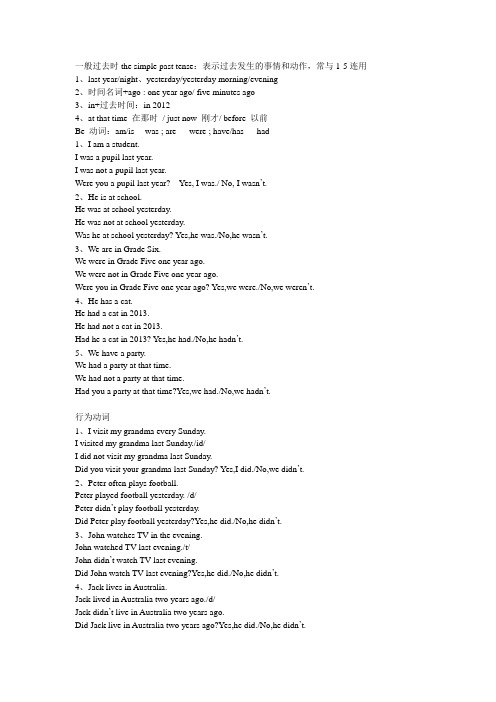
一般过去时the simple past tense:表示过去发生的事情和动作,常与1-5连用1、last year/night、yesterday/yesterday morning/evening2、时间名词+ago : one year ago/ five minutes ago3、in+过去时间:in 20124、at that time 在那时/ just now 刚才/ before 以前Be 动词:am/is ---was ; are --- were ; have/has --- had1、I am a student.I was a pupil last year.I was not a pupil last year.Were you a pupil last year? Yes, I was./ No, I wasn’t.2、He is at school.He was at school yesterday.He was not at school yesterday.Was he at school yesterday? Yes,he was./No,he wasn’t.3、We are in Grade Six.We were in Grade Five one year ago.We were not in Grade Five one year ago.Were you in Grade Five one year ago? Yes,we were./No,we weren’t.4、He has a cat.He had a cat in 2013.He had not a cat in 2013.Had he a cat in 2013? Yes,he had./No,he hadn’t.5、We have a party.We had a party at that time.We had not a party at that time.Had you a party at that time?Yes,we had./No,we hadn’t.行为动词1、I visit my grandma every Sunday.I visited my grandma last Sunday./id/I did not visit my grandma last Sunday.Did you visit your grandma last Sunday? Yes,I did./No,we didn’t.2、Peter often plays football.Peter played football yesterday. /d/Peter didn’t play football yesterday.Did Peter play football yesterday?Yes,he did./No,he didn’t.3、John watches TV in the evening.John watched TV last evening./t/John didn’t watch TV last evening.Did John watch TV last evening?Yes,he did./No,he didn’t.4、Jack lives in Australia.Jack lived in Australia two years ago./d/Jack didn’t live in Australia two years ago.Did Jack live in Australia two years ago?Yes,he did./No,he didn’t.5、She dances well.She danced well before./t/She didn’t dance well before.Did she dance well before?Yes,she did./No,she didn’t.6、A car stops here.A car stopped here just now./t/A car didn’t stop here just now.Did a car stop here just now?Yes,it did./No,it didn’t.7、They study hard.They studied hard at that time./id/They didn’t study hard at that time.Did they study hard at that time?Yes,they did./No,they didn’t.8、He goes to school on foot.He went to school on foot last year.He didn’t go to school on foot last year.Did he go to school on foot last year?Yes,he did./No,he didn’t.9、I do my homework every day.I did my homework five minutes ago./did/I didn’t do my homework five minutes ago.Did you do your homework five minutes ago?Yes,I did./No,I didn’t.行为动词过去式变化规则:1、大部分加ed:visit\play\ask\watch..2、以e结尾加d:live\dance\love3、以辅音字母加y:先把y变i 加ed:study\hurry\try4、以一个辅音字母结尾的重读闭音节应由一个元音和一个辅音字母结尾的动词,先双写该辅音字母,再加ed:jog\stop不规则动词:am is/are/have has/do/come/give/run/drink/begin/drink/give/sing/sit/eathear/makekeep/leaveknow/drawbring/buy/catch/cango/say/see/get/drive/take/meetlet/cut/put/read/cost读音:1、元音、浊辅音:/d/2、清辅音:/t/3、/t/、/d/:/id/结构:1、肯:主语+动词过去式+其它2、否:主语+didn’t+动原+其它3、一般疑问:Did+主语+动原+其它?4、特殊疑问:特殊疑问词+did+主语+动原+其它?特例:Who+动词过去式+其它?反义疑问:。
一般过去时时态
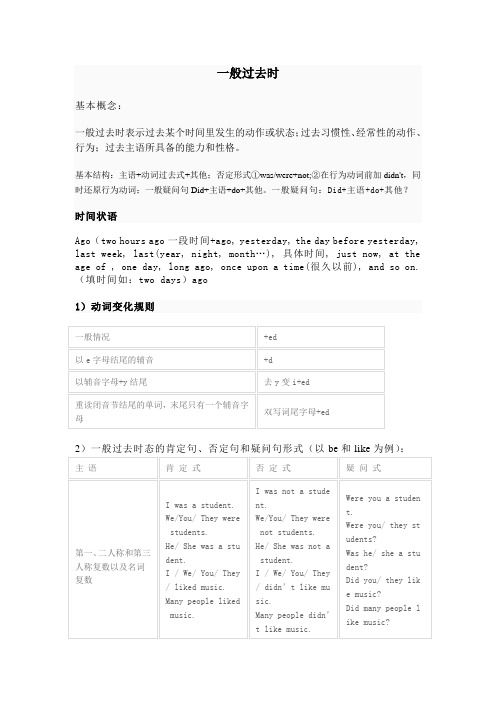
一般过去时基本概念:一般过去时表示过去某个时间里发生的动作或状态;过去习惯性、经常性的动作、行为;过去主语所具备的能力和性格。
基本结构:主语+动词过去式+其他;否定形式①was/were+not;②在行为动词前加didn't,同时还原行为动词;一般疑问句Did+主语+do+其他。
一般疑问句:Did+主语+do+其他?时间状语Ago(two hours ago一段时间+ago, yesterday, the day before yesterday, last week, last(year, n ight, month…), 具体时间, just now, at the age of , one day, long ago, once upon a time(很久以前), and so on.(填时间如:two days)ago1)动词变化规则2)一般过去时态的肯定句、否定句和疑问句形式(以be和like为例):3)一般过去时的用法:1.过去发生的动作。
例如:The police stopped me on my way home last night.2.过去存在的状态。
例如:They weren't able to come because they were so busy.3. 常用于一般过去时的时间状语:yesterday,three months ago,last year,in 1979,often,always 例题解析:举一反三,学的更轻松!1. r. Mott is out. But he ______ here a few minutes ago.A. wasB. isC. will beD. would be解析:时分钟前发生的动作,应该用一般过去时。
应选 A,2.---Hi, Tom.---Hello, Fancy. I ______ you were here.A.don't knowB.won't thinkC. thinkD. didn't know解析:虽然句中没有明确的时间状语,但是可以通过上下文语境判断出,我说这话之前不知道,但是现在知道了,表示过去的动作,要用过去时态。
一般过去时知识点
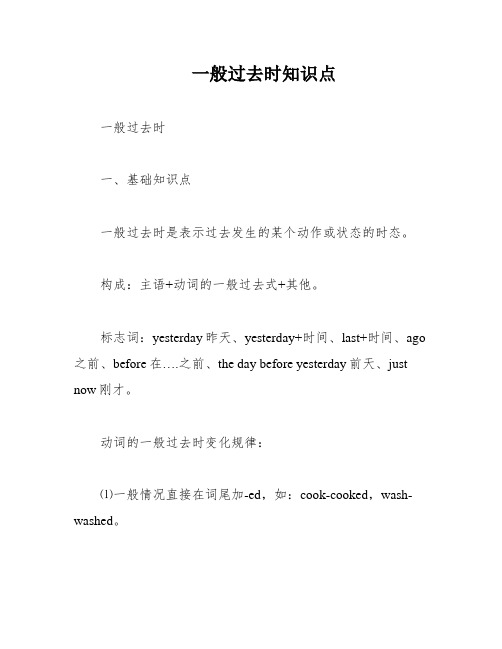
一般过去时知识点一般过去时一、基础知识点一般过去时是表示过去发生的某个动作或状态的时态。
构成:主语+动词的一般过去式+其他。
标志词:yesterday昨天、yesterday+时间、last+时间、ago 之前、before在….之前、the day before yesterday前天、just now刚才。
动词的一般过去时变化规律:⑴一般情况直接在词尾加-ed,如:cook-cooked,wash-washed。
⑵以不发音的e结尾的动词,在词尾+d,如:like-liked,live-lived。
⑶以重读闭音节结尾的动词,双写最后一个字母再在词尾+ed,如:ped,shop-shopped,plan-planned。
⑷以辅音字母+y结尾的动词,要改y为i再加ed,如:study-studied,carry-carried。
另外,还需记住不规则动词的一般过去时变形。
二、做题步骤:⑴先找到句子中表示一般过去时的标志词。
⑵确定句子的动词是用be动词还是行为动词。
Be动词的过去时练一、用be动词的适当形式填空1.I was at school just now.2.He was in Beijing on n last week.3.We were students two years ago.4.They were on the farm a moment ago. 5.Yang Ling was eleven years old last year. 6.There was an apple on the plate yesterday. 7.There was some milk in the fridge on Sunday.二、用行为动词的适当形式填空1.He lived in Wuxi two years ago.2.The cat ate a bird last night.3.We had a party last Halloween.4.Nancy picked up oranges on the farm last week。
一般过去时知识点
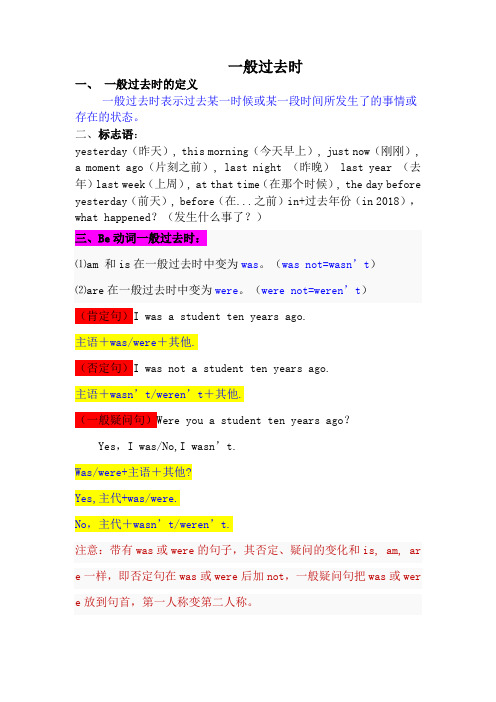
一般过去时一、一般过去时的定义一般过去时表示过去某一时候或某一段时间所发生了的事情或存在的状态。
二、标志语:yesterday(昨天), this morning(今天早上), just now(刚刚), a moment ago(片刻之前), last night (昨晚) last year (去年)last week(上周), at that time(在那个时候), the day before yesterday(前天), before(在...之前)in+过去年份(in 2018),what happened?(发生什么事了?)三、Be动词一般过去时:⑴am 和is在一般过去时中变为was。
(was not=wasn’t)⑵are在一般过去时中变为were。
(were not=weren’t)(肯定句)I was a student ten years ago.主语+was/were+其他.(否定句)I was not a student ten years ago.主语+wasn’t/weren’t+其他.(一般疑问句)Were you a student ten years ago?Yes,I was/No,I wasn’t.Was/were+主语+其他?Yes,主代+was/were.No,主代+wasn’t/weren’t.注意:带有was或were的句子,其否定、疑问的变化和is, am, ar e一样,即否定句在was或were后加not,一般疑问句把was或wer e放到句首,第一人称变第二人称。
(特殊疑问句)1.对I提问:Who was a student ten years ago?(Who作为主语时,谓语动词用三单)四、实义动词一般过去时:(肯定句)I walked to school yesterday.主语+动词过去式+其他.(否定句)I didn’t walk to school yesterday.主语+didn’t + 动词原形+其他.否定句变化规则:1、找be动词2、若无be动词,找情态动词(could)3、若无情态动词,请助动词(did)来帮助4、did放于主语的后面,动词的前面,加上not,did not= didn't5、动词变原形6、some->any and->or too->either(一般疑问句)Did you walk to school yesterday?Yes,I did. No,I didn’t.Did +主语+动词原形+其他?Yes,主代+did.No,主代+didn’t.一般疑问句变化规则:1、找be动词2、若无be动词,找情态动词(could)3、若无情态动词,请助动词(did)来帮助4、did放于开头,首字母大写5、第一人称变第二人称6、动词变原形7、some->any and->or too不变either(特殊疑问句)I went to school on foot yesterday.1.对I 提问:Who went to school on foot yesterday?2.对went to school 提问:What did you do on foot yesterday?3.对school 提问:Where did you go on foot yesterday?4.对on foot 提问:How did you go to school yesterday?5.对yesterday提问:When did you go to school on foot?动词变化规则:1、直接在动词后面加ed。
一般过去时

一般过去时(the past simple tense)用法:1.表示过去确定时间内发生的动作或状态,常与yesterday,last year, ago, once upon a time, just now, recently, during the day, for many years ect.2.表示过去连续发生的动作3.表示过去一段时间内经常或反复的动作,常与always ,never连用4.在since引导的从句中,主句用现在完成时,从句用一般过去时。
5.在时间,条件状语从句中,用一般过去时表示过去将来时结构:肯定:主+动词过去式+其他否定:主+wasn’t/weren’t +其他主+didn’t +动原+其他一般疑问句:was/were+主+动原+其他?Did +主+动原+其他?练习Ⅰ.用所给词的适当形式填空1.Jenny (not go to bed) until 11:00 o’clock last night.2.I (see) Li Lei (go) out just now.3.He (do) his homework every day. But he (not do)it yesterday.4.When I was young, I (play) games with my friends.5. She likes _________ newspapers, but she _________ a book yesterday. (read)6. _______ they ________ (sweep) the floor on Sunday? No, they _________.7.It ____ (be) the 2nd of November yesterday. Mr White ___ (go) to his office by car.8.I want to ______ apples. But my dad _______ all of them last month. (pick)9. Jim's mother _________ (plant) trees just now.10.He _______ football now, but they _______ basketball just now. (play)Ⅱ.改错1.How is Jane yesterday?2.What did he last week?3.Did you saw him just now?4.H e often goes home at 11:00 last month.5.Tom wasn’t watch TV last night.6.Tom suddenly is ill last night and have to stay at homefoeanother day.Ⅲ.改写句子1.I watched the night sky for about an hour. 改为否定句2.He waited for you three hours ago. 改为一般疑问句3.Was he a doctor two years ago? 做否定回答4.She went shopping with her friends. 对划线部分提问5.Karen had extra classes next week. 对划线部分提问。
一般过去时详解

基本概念一般过去时(simple past tense)表示过去某个时间里发生的动作或存在的状态,常和表示过去的时间状语连用,如:yesterday,last night,in 1990,two days ago 等。
一般过去时也表示过去经常或反复发生的动作,常和often,always等表式频率的时间状语连用。
过去习惯性、经常性的动作、行为;过去主语所具备的能力和性格。
时间状语Ago(two hours ago(一段时间+ago),yesterday(句子开头或结尾),the day before yesterday,last week,last(year,night,month…),具体时间(如Jan.fourth),just now,at the age of,one day,long ago,once upon a time,and so on,this morning.long long ago(很久以前)。
1.直接加ed:work—— worked look——looked play——played,2.以不发音e结尾的单词,直接加d:live ——lived hope——hoped use——used,3 以辅音字母+y结尾的,变y为i加ed:study—— studied carry——carried worry——worried,4以元音字母+y结尾的,直接加ed:enjoy ——enjoyed play——played5 以重读闭音节结尾的,双写最后的辅音字母+ed:stop——stopped plan——planned不规则变化的动词过去式:have---had are---were get---got say---said feel---felt do/does---didis---was基本结构主语+动词过去式+其他否定形式:①was/were+not;②在行为动词前加didn't,同时还原行为动词一般疑问句①Did+主语+do+其他?②Was\Were+主语+ do sth例句:She often came to help us in those days.I didn't know you are so busy.特殊疑问句疑问词+did+主语+动词原形+其他一般过去式的构成形式肯定式疑问式否定式疑问否定式I worked Did I work?I did not work Did I not work?He(she,it) worked Did he(she,it) work? He (she,it)did not work Did he(she,it)not work? We worked Did we work? We did not work Did we not work?You worked Did you work? You did not work Did you not work? They worked Did they work? They did not work Did they not work?用法(1)一般过去时表示在过去某个特定时间发生,也可以表示过去习惯性、经常性的动作。
一般过去时的用法
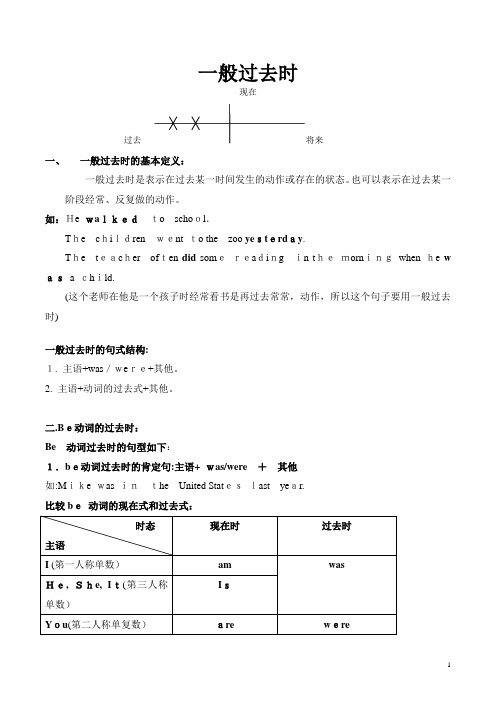
一般过去时现在过去将来一、 一般过去时的基本定义:一般过去时是表示在过去某一时间发生的动作或存在的状态。
也可以表示在过去某一阶段经常、反复做的动作。
如:He wa lked to scho ol .T he c hi ldren went to the zoo ye st erd ay .T he t eac her of ten did som e rea di ng in t he morn ing when he w as a ch ild.(这个老师在他是一个孩子时经常看书是再过去常常,动作,所以这个句子要用一般过去时)2. 主语+动词的过去式+其他。
二.B e动词的过去时: Be 动词过去时的句型如下:1.b e动词过去时的肯定句:主语+ was/were + 其他 如:M ike was in the United Stat es last ye ar. 比较b e 动词的现在式和过去式: 一般过去时的句式结构: 1. 主语+was /we re+其他。
如:Iwasvery tiredlast night.Youwere absentfrom school two daysago.There weresome booksthere. (那儿曾经有一些书。
)注意:Therebe句型用于一般过去时需把is/are 变为它们的过去式:There was (were) …2. Be动词过去时的否定句:主语+was/were+not+其他He wasnot inCanadalast year.Be 过去式的否定句结构,只要在was/were后面加上not 就可以了。
它的缩写形式为:wasn’t 和weren’t如:Iwasn’tbusy yesterday.There weren’t any boys in the room.3. Be动词过去时的疑问句:(1)was/were+ 主语+其他(一般疑问句)----Wasit rainingin Beijingyesterday?----No,itwasn’t. It was cloudy.(2)特殊疑问词+were/was+主语+其他(特殊疑问句)----Where were youyesterdaymorning?----I was atschool.Be动词过去式一般疑问句的结构,只要把was/were 提到主语前面,some变any ,and变成or.回答时,Yes, … was/were.No, … wasn’t/weren’t.以疑问词开始的特殊疑问句,回答时,不能用Yes, No.直接回答所问的问题即可。
一般过去时的定义

01
02
03
基本形式
动词的过去式,通常是在 动词后面加-ed。例如: work → worked。
规则变化
大部分动词的过去式都有 规则变化,即直接在动词 后面加-ed。例如:play → played。
不规则变化
有些动词的过去式有不规 则变化,需要特别记忆。 例如:go → went。
一般过去时与现在时的区别
一般过去时则强调动作的完成性,通常与时间状语连用, 例如“He read a book last night”(他昨晚读了一本 书)。
一般过去时与过去完成时的比较
定义 过去完成时表示在过去的某个时间之前已经完成的动作或状态。
一般过去时表示在过去的某个时间点发生的动作或状态。
一般过去时与过去完成时的比较
时间点不同
表达方式不同
一般过去时表示过去某个时间点发生 的动作或状态,而现在时表示现在正 在进行的动作或状态。
一般过去时通常与表示过去的连词或 副词(如yesterday、last week)一 起使用,而现在时不需要这些连词或 副词。
语境不同
使用一般过去时通常是为了描述过去 发生的事情,提供背景信息或者对比 现在的情况;而现在时则强调当前的 情况或正在进行的动作。
一般过去时通常用于描述纯粹发生在过去的动作或状态, 例如“I saw the movie last night”(我昨晚看了这部 电影)。
一般过去时与过去进行时的比较
定义
过去进行时表示在过去某一时刻正在进行的动作。
一般过去时表示过去的某个时间点发生的动作或状态。
用法
过去进行时强调动作的持续性,通常与时间状语连用,例 如“He was reading a book at 9 o'clock yesterday” (他昨天9点正在读书)。
一般过去时
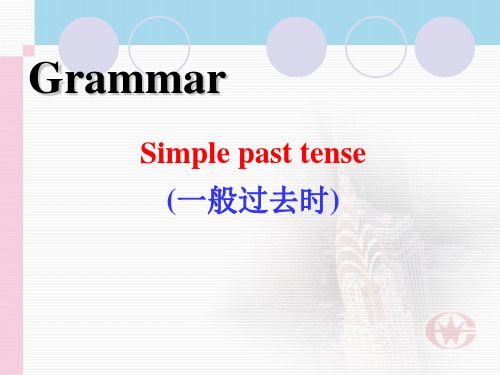
Was/were +主语+其他?
Was he happy yesterday? -Yes, he was./No, he wasn’t. Were they in the classroom? -Yes, they were./No, they weren’
含有行为动词的一般过去时: I go to school every day. I went to school yesterday. He did his home work yesterday.
一般过去时的结构
• 含有be动词的一般过去时 • 含有实义动词(行为动词)的一般过去时 • 含有情态动词的一般过去时
一、含有be动词的一般过去时
刘翔现在31岁。
Liu Xiang is ___ 31 years old now.
刘翔2004年21岁。
Liu Xiang was ____ 21 ye有be动词的一般过去时
我今年12岁。 am I _______ twelve years old this year. 我去年11岁。
I ________ was eleven years old last year.
他每天在家。 He is at home every day . 他昨天在家。 He was at home yesterday .
常与一般过去时态连用的时间有:
①yesterday, yesterday morning, the day before yesterday ②last night last week, last month, last year… ③two days ago, three years ago… a moment ago=just now(刚才) ④in 1990, (in 1998…) ⑤this morning, this Monday ⑥When I was 5 years old
一般过去时用法及概念

一般过去时的用法及概念在英语语法中,一般过去时是一个重要的时间表达方式。
它主要用于描述过去发生的事情,或者在过去某个特定时间点完成的动作。
理解和掌握一般过去时的用法和概念对于提高英语水平具有重要意义。
一、一般过去时的概念一般过去时是一种动词时态,表示在过去某个时间或时间段内发生的动作或存在的状态。
这个时态的主要标志是动词的一般过去式形式,即动词原形后面加-ed。
二、一般过去时的用法1. 描述过去的事实或情况:例如,“Yesterday, I went to the park.”(昨天,我去了公园。
)2. 表示过去习惯性的动作:例如,“When I was a child, I always played football with my friends after school.”(当我还是个孩子的时候,放学后我总是和朋友们一起踢足球。
)3. 用于叙述故事或讲述过去的历史事件:例如,“In 1969, Neil Armstrong walked on the moon for the first time in human history.”(1969年,尼尔·阿姆斯特朗首次在人类历史上在月球上行走。
)三、一般过去时的构成一般过去时通常由主语+动词的一般过去式+宾语组成。
动词的一般过去式是在动词原形的基础上加上-ed。
但需要注意的是,有些不规则动词的过去式形式需要特殊记忆,例如go的过去式是went,eat的过去式是ate等。
四、一般过去时的否定句和疑问句在一般过去时的否定句中,我们使用助动词did not(didn't)+动词原形。
例如,“I didn't eat breakfast this morning.”(今天早上我没有吃早餐。
)在一般过去时的疑问句中,我们同样使用助动词did,将did提到主语之前。
例如,“Did you go to the party last night?”(你昨晚去参加聚会了吗?)。
一般过去时的知识点归纳

一般过去时的知识点归纳一般过去时知识点归纳一、一般过去时的定义一般过去时(Simple Past Tense)用于描述在过去某个具体时间发生的动作或存在的状态,以及过去经常或反复发生的动作。
二、一般过去时的构成1. 规则动词:一般在动词原形后加-ed。
- 例:worked, played, visited2. 不规则动词:需记忆其过去式形式。
- 例:went, saw, ate三、一般过去时的用法1. 描述过去具体时间发生的动作或状态。
- 例:He walked to school yesterday.2. 表示过去经常或反复发生的动作。
- 例:When I was a child, I often played football after school.3. 用于时间、条件状语从句中,表示过去将来的动作。
- 例:I said I would call her when I got home.四、一般过去时的标志词1. 具体的时间状语:yesterday, last week, in 1990等。
2. 过去的时间状语:a moment ago, just now, the other day等。
3. 频率副词:never, seldom, sometimes, often, usually等。
五、不规则动词的过去式变化1. 改变元音字母:sing-sang, swim-swam2. 改变辅音字母:begin-began, run-ran3. 完全不规则变化:go-went, come-came, eat-ate六、一般过去时与现在完成时的区别1. 一般过去时强调过去某个时间点发生的具体动作,而现在完成时强调过去发生的动作对现在的影响或结果。
- 例:I visited the museum last week. (强调上周的动作)- 例:I have visited the museum before. (强调现在对博物馆的了解)七、一般过去时的否定句和疑问句1. 否定句:在动词前加did not (didn't)。
一般过去时全文

3.一般疑问句:Be动词 / Did+主语+动词原形+其 他?
如:Were you in school last Friday? Did your mother cook dinner last night? Did you wash your clothes last Sunday?
4.特殊疑问句:特殊疑问词+一般疑问句? 如:I was at home yesterday. → Where were you yesterday?
2. 用所给动词的适当形式填空。 (1)Did you _p_l_a_y_ (play) the piano yesterday? (2)I _w_r_o_t_e (write) a letter last night. (3)Who _c_l_e_a_n_e_d_ (clean) the window yesterday? (4)Sarah__ra_n__ (run) to school this morning. (5)Tom _w_e_n_t_ (go) to the park last Sunday.
1. It
(be) Mary's birthday last Friday.
2. We all
(have) a good time last night.
解析:本题考查动词的过去式。1,2小题中的时间词
last Friday 和last night 都2. had
3. meet _m_e_t__ 6. teach _ta_u_g_h_t 9. fly _f_le_w__ 12. drive _d_r_o_v_e 15. tell _t_o_l_d_
二、用括号内所给动词的适当形式填空。 1. Tom and Mary _c_a_m_e_(come) to China last month. 2. Mary _r_e_a_d_(read) English yesterday morning. 3. There _w_e_r_e_(be) no children here ten minutes ago. 4. What __d_id__ you __d_o__ the day before yesterday?(do) 5. Last week wep_i_c_ke_d_(pick) many apples on the farm.
一般过去时
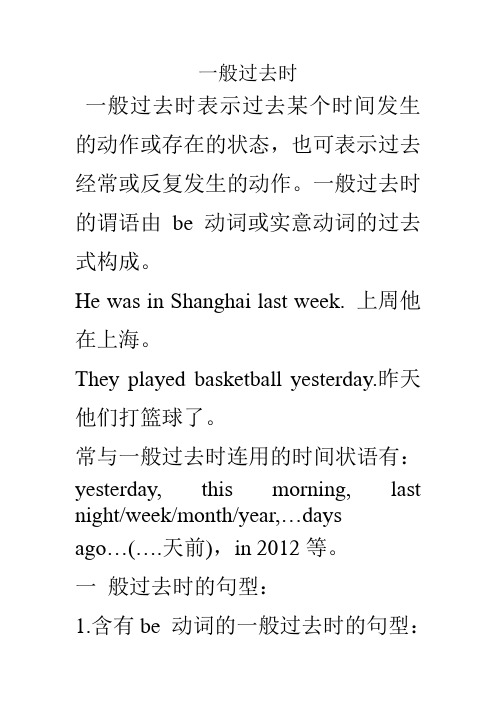
一般过去时
一般过去时表示过去某个时间发生
的动作或存在的状态,也可表示过去经常或反复发生的动作。
一般过去时的谓语由be 动词或实意动词的过去式构成。
He was in Shanghai last week. 上周他
在上海。
They played basketball yesterday.昨天
他们打篮球了。
常与一般过去时连用的时间状语有:yesterday, this morning, last night/week/month/year,…days ago…(….天前),in 2012等。
一般过去时的句型:
1.含有be 动词的一般过去时的句型:
(1)肯定句:主语+was/were+其他。
He was late yesterday.昨天他迟到了。
(2)否定句:主语+was/were +not+其他?
They were not at home yesterday.他们昨天没在家。
(3)一般疑问句:Was/ Were +主语+其他?
Were you ill yesterday? 你昨天生病了吗?
(4)特殊疑问句:疑问词+was/were +主语+其他?
How was your weekend? 你周末过得怎么样?
2.含有实意动词的一般过去时的句型(1)肯定句:主语+动词过去式+其他。
They had a party yesterday.他们昨天举行了一个聚会。
(2)否定句:主语+didn’t+动词原形+其他。
一般过去时

2.动词过去式变化的一般规则
以-e结尾的动词,直接加-d
e.g.: believe---believed waste---wasted shave---shaved live---lived
2.动词过去式变化的一般规则
③ 以重读闭音节结尾并且词尾只有一个辅音 字母的单词,要双写最后一个辅音字母再 加-ed
一般过去时的时间状语
e.g.: She emptied the box ten minutes ago. 十分钟前,她把盒子里的东西倒了出 去。 He went shopping yesterday. 他昨天去逛街了。 His father lived in Russia 2 years ago.两年前他爸爸住在俄罗斯。
e.g.: stop---stopped fit---fitted regret---regretted
2.动词过去式变化的一般规则
④ 以辅音字母加y结尾的动词,把y变成i再 加-ed
e.g.: study---studied empty---emptied cry---criedBiblioteka 2.动词过去式变化的一般规则
2.动词过去式变化的一般规则。
一般的动词后面直接加-ed e.g.: work---worked jump---jumped cook---cooked clean—cleaned (读音规律:清音后面读清音,浊音后面读浊 音,/t/、/d/后面读【id】 e.g.: dust---dusted
一般过去时的时间状语
动词一般过去时的疑问句要借助did,但后 面的动词要变成原型。 e.g.: He made a desk for his son yesterday. Did he make a desk for his son yesterday? Yes, he did. No, he didn’t.
一般过去时

一般过去时一、一般过去时的定义一般过去时表示过去某一时候或某一段时间所发生了的事情或存在的状态。
常与过去时间yesterday, this morning, just now, a moment ago, in May, last night / year / week, once upon a time, the other day, before …, when – clause, in the past连用。
如:What did you do yesterday 昨天你干了什么I met Lin Tao this morning. 今天上午我会到了林涛。
I was there a moment ago. 刚才我在那儿二、用法说明1表示在过去某个时间所发生的动作或所处的状态。
常与yesterday, last week, in 1989, just now, a moment ago, the other day等连用。
如:He was here just now. 他刚才还在这里。
What did you do yesterday 你昨天做了什么事2在过去一段时间内的经常性或习惯性动作。
如:We often played together when we were children. 我们小时候常在一起玩。
注:表示过去经常发生的动作还可用used to 和would。
如:He used to smoke a lot, but he doesn’t now. 他过去经常抽烟,但现在不抽了。
Whenever we were in trouble, he would help us. 每当我们遇到困难,他都会帮助我们。
3表示主语过去的特征或性格。
如:At that time she was very good at English. 那时她英语学得很好。
4用在状语从句中表示过去将来。
如:He said he would wait until they came back.5一般过去时有时可以表示现在,多与 want, hope, wonder, think, intend 等动词连用,使语气更委婉。
一般过去时

一、一般过去时的用法:1. 表示过去的动作或状态,常和明确的过去时间状语连用,如:yesterday, last week, three days ago, in 1998,just now等,或与由when引导的从句连用。
2. 也可以表示过去某一段时间内经常或反复出现的动作。
句子中常带有every day, often, usually, always, sometimes等时间状语。
例:When I worked in the company, I got up early every morning.在那家公司上班时,我每天早晨都起得很早。
In the past few years she usually went touring during her summer holidays.在过去的几年里,每逢暑假她总是出去旅游。
二、一般过去时的形式to be:第一人称单数和第三人称单数用was, 其余的人称用were。
to do(行为动词):行为动词的过去式有两类,一类是规则动词,另一类是不规则动词。
to have: 各人称,单、复数一律用had。
肯定句否定句beI /He/She/It was...I/ He /She/It was not ...We/You/They were...We /You/They were not...haveI /He/She/It/ We/You/They had...I/ He /She/It/We/You/They had not(有) ...I/He/She/It/We/You/They did not have (吃/喝/进行...)…行为动词I /He/She/It/ We/You/They studied…I/ He /She/It/ We /You/They did not study…一般疑问句简略回答beWas he/she/it...?Yes,he was.(No,he wasn’t.)Were we/you/they...?Yes,you were. (No,you were not)haveHad I/he/she/it/you/we/ they...? Did I/you/he... have... Yes,you had.(No,you hadn’t.)Yes,you did.(No,you didn’t.)行为动词Did he/she/ it/ we/you/ they study..?Yes,you did.(No,you didn’t.)I. 一般过去时的概念一般过去时表示过去某个时间发生的动作或存在的状态。
- 1、下载文档前请自行甄别文档内容的完整性,平台不提供额外的编辑、内容补充、找答案等附加服务。
- 2、"仅部分预览"的文档,不可在线预览部分如存在完整性等问题,可反馈申请退款(可完整预览的文档不适用该条件!)。
- 3、如文档侵犯您的权益,请联系客服反馈,我们会尽快为您处理(人工客服工作时间:9:00-18:30)。
一般过去时一.一般过去时口诀:1.一般过去时并不难,表示过去动作、状态记心间。
2.动词要用过去式,时间状语句末站。
3.否定句很简单,didn't 站在动词原形前,其它部分不要变。
4.一般疑问句也好变,did放在句子前,主语、动原、其它部分依次站。
5. 特殊疑问句也简单,疑问词加一般疑问句记心间。
6. 最后一条请注意,动词过去二.一般过去时的结构(可分三类不同的结构)概念:一般过去时用来表示过去某一时间内发生的动作或存在的状态以及过去习惯性、反复性的动作。
谓语动词要用动词的过去式,常和表示过去的时间状语连用,如yesterday昨天、last night昨晚、last week上周、last year去年等。
Be动词的一般过去时在没有实义动词的句子中使用be动词,am is 的过去式为was; are的过去式为were肯定句式:主语+ be(was , were) + 其它.否定句式:主语+ be(was , were) + not + 其它.一般疑问句:Be(was , were) + 主语+ 其它?注:在这种构成中,be动词有人称和数的变化,即要根据主语选用was / were。
Be动词分为单数和复数,was是表示单数,were是表示复数。
2实义动词的一般过去时态肯定句要使用动词的过去式,否定句和疑问句要使用助动词do和does 的过去式did.肯定句式:主语+ 动词(过去式)+ 其它否定句式:主语+ didn’t + 动词(原形)+ 其它【did not = didn’t】一般疑问句:Did + 主语+ 动词(原形)+ 其它【do , does的过去时均为did】?注 1. did和didn’t 是构成一般过去时的助动词,其特点是要在其后跟动词的原形。
2. 实意动词do的一般过去时I do my homework every day.(用yesterday改写句子)I did my homework yesterday.I didn’t do my homework yesterday.(否定句)Did you do your homework yesterday?Yes ,I did. /No, I didn’t.(一般疑问句)3情态动词的一般过去时态情态动词的过去式:can→could , may→might , must→must ,will-would,should-should。
特殊疑问句式:特殊疑问词+be过去式+主语+其他?特殊疑问词+情态助动词过去式+主语+动词原形+其他?特殊疑问词+do/does过去式+主语+动词原形+其他?What was your former name?你以前叫什么名字?Why was he late for school last Monday?上星期一他为什么迟到?What could she do twenty years ago?20年前她能做什么?三.一般过去时的判断标志词yesterday , the day before yesterday , last + 时间, this morning 时间+ ago , just now , a moment ago , in + 过去的时间,注意:一般过去时表示过去经常或反复发生的动作,常和often经常, always 总是,once a week一周一次,等表示频度的时间状语连用四.一般过去时的基本用法①表示过去某个特定时间发生的动作或存在的状态。
He suddenly fell ill last night. 他昨晚突然病倒了。
②表示过去的习惯性或经常发生的动作She went to the cinema once a month .③叙述过去连续发生的一件件事She got up early, fetched water, cleaned the room and then went out for a walk. 她早早起床,提水,打扫房间然后出去散步。
五.动词过去式的变化规则1. 规则变化①一般情况下,直接加edwork—— workedlook——lookedwalk——walked①以e结尾的单词,直接加dlive ——livedhope——hopeduse——used①以辅音字母+y结尾的,变y为i加edstudy——studiedcarry——carried①以元音字母+y结尾的,直接加edenjoy ——enjoyedplay——played①以重读、一个辅音字母结尾的闭音节结尾的动词,双写最后的辅音字母+ed stop—— stoppedplan——plannedprefer——preferred六.为了帮助同学们记住不规则动词,现在把教材中出现的不规则动词分为几个类型,每个类型中又分若干组,尽量找出每组中各词变化形式的共同点,以帮助记忆。
4. A—B—B型(过去式和过去分词同形)一般过去时练习题一、写出下列动词的过去式is\am_________ fly_______ plant________ are ________ drink______ play_______ go________ make ________ does_________ dance____ worry________ ask _____ taste_________ eat__________ draw______ put ______ throw________ kick_________ pass_______ do ________二、用be动词的适当形式填空1. I ______ an English teacher now.2. She _______ happy yesterday.3. They _______ glad to see each other last month.4. Helen and Nancy ________ good friends.5. The little dog _____ two years old this year.6. Look, there ________ lots of grapes here.7. There ________ a sign on the chair on Monday.8. Today _____ the second of June. Yesterday ______ the first of June. It _____ Children's Day. All the students ______ very excited.三、句型变换1 There was a car in front of the house just now.否定句:_______________________________________________________ 一般疑问句:___________________________________________________ 肯定回答:_____________________________________________________否定回答:_____________________________________________________ _____2 They played football in the playground.否定句:_______________________________________________________ 一般疑问句:___________________________________________________ 肯定回答:_____________________________________________________ 否定回答:_____________________________________________________四、用所给动词的适当形式填空1. I ______ (watch) a cartoon on Saturday.2. Her father _______ (read) a newspaper last night.3. We _________ to zoo yesterday, we _____ to the park. (go)4. ______ you _______ (visit) your relatives last Spring Festival?5. ______ he _______ (fly) a kite on Sunday? Yes, he ______.6. Gao Shan _______ (pull) up carrots last National Day holiday.7. I ____________ (sweep) the floor yesterday, but my mother ______.8. What _________ she _________ (find) in the garden last morning? She _________ (find) a beautiful butterfly.9. It _________ (be) Ben's birthday last Friday10. 10. We all _________ (have) a good time last night.11. He _________ (jump) high on last Sports Day.12. 12. Helen _________ (milk) a cow on Friday.13. She likes _________ newspapers, but she _________ a bookyesterday. (read)14. He ______ football now, but they _______basketball just now. (play)15. Jim's mother ____________ (plant) trees just now.16. _______ they ________ (sweep) the floor on Sunday?No, they _________.17. I _______ (watch) a cartoon on Monday.18 We ____ (go) to school on Sunday.19. It ____ (be) the 2nd of November yesterday. Mr White ___ (go) to his office by car.20. Gao Shan ________ (put) the book on his head a moment ago.21. Don't ______ the house. Mum _______ it yesterday. (clean)22. What _________ you ______ just now? I _______ some housework. (do)23. They _________ (make) a kite a week ago.24. I want to ______ apples. But my dad _______ all of them last month. (pick)25. _______ he ______ the flowers this morning? Yes, he _____. (water)26. She ____ (be) a pretty girl. Look, she _____ (do) Chinese dances.27. The students often _________ (draw) some pictures in the art room.28.What ______ Mike do on the farm? He ________ cows. (milk)五、句型转换1、Lucy did her homework at home.(改否定句)Lucy ___________ ___________ her homework at home.2、He found some meat in the fridge(冰箱).(变一般疑问句)___________ he __________ ___________ meat in the fridge?3、She stayed there for a week.(对划线部分提问)__________ ___________ __________ she __________ there?4、There was some orange in the cup.(变一般疑问句)_________ there ___________ orange in the cup?六、中译英1.我的故事书刚才还在手表旁边.___________________________________________________________ 2.他们的外套上个礼拜放在卧室里了。
